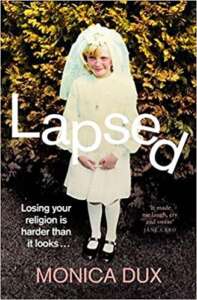Roy Williams reviews Lapsed by Monica Dux.
Can a sincere Christian believer lose their faith? Calvinists would insist not – such “faith” was never real in the first place – but in other traditions to “lapse” or “fall away” is a dangerous possibility to be guarded against. At any rate, there are millions of people across the West who would describe themselves as lapsed including, probably, hundreds of thousands in contemporary Australia.
Monica Dux is one of them. A whip-smart feminist author with a regular column in The Age, Dux has written a moving personal memoir that will resonate with many. Lapsed is enlivened by biting if blasphemous humour, and is a scathingly effective denunciation of the Roman Catholic Church, from Pope Francis down. For that reason, it should be read by all those who still love that institution or respect its teachings.
Dux grew up in the 1970s and ’80s in the middle-class Sydney suburb of North Ryde. Until her mid-teens she was, in her own words, “the perfect Catholic girl and the one most likely to meet our Lord”. Her mother was devout (according to Dux, she literally never missed Sunday mass; a foot-high plaster statue of Mary adorned her dressing table). Evidently, Mrs Dux’s influence on her young daughter was profound.
To give the flavour, ten-year old Monica starred as Jesus in her Grade 5 Easter play. She baptised her budgie. She was such a goody two shoes that she felt compelled to invent sins to which to confess to her parish priest, one Father McGlone. Her favourite movie was the 1943 Hollywood biopic The Song of Bernadette (“tasteful Catholic torture porn”). She worried for the immortal soul of her “errant Anglican” father. Unsurprisingly, she aspired to be a nun.
These telling details accumulate, and there are some wonderfully evocative photos. The best one is of Dux in her First Communion dress: it adorns the front cover.
 Dux admits to having “loved every minute of being a young Catholic” until, at age 15 or 16, she rebelled, converting to “outrageous atheism”. Persistent unresolved doubts about the supernatural were part of the reason. But the catalyst, she explains, was outrage at Church teachings about sex, in particular its prohibition on the use of condoms during the AIDs epidemic of the 1980s.
Dux admits to having “loved every minute of being a young Catholic” until, at age 15 or 16, she rebelled, converting to “outrageous atheism”. Persistent unresolved doubts about the supernatural were part of the reason. But the catalyst, she explains, was outrage at Church teachings about sex, in particular its prohibition on the use of condoms during the AIDs epidemic of the 1980s.
Dux flaunted her apostasy at school by dressing as a giant condom for a Health Class project. In Lapsed, she excoriates the Church’s official teachings on, among other things, abortion, priestly celibacy, fornication, and homosexuality. “Why is it,” she asks, “that a religion that’s supposed to be about spiritual commune with God is so obsessively focused on *******?”
All this is understandable and often amusing – albeit, for any serious Christian believer, sadly unbalanced. Dux’s knowledge of theology is patchy. In the book’s weakest parts she relies on discredited authorities on Jesus such as H.S. Reimarus and Reza Aslan, to say nothing of the risible Richard Dawkins.
Yet Lapsed has undeniable power, derived from the author’s patent honesty and seriousness of purpose. She wrote it because “for all my bombast about my utter disbelief … Catholicism has trailed me like a shadow”. To this day, she admits, she is “conflicted by a strange religious legacy”.
Above all, she feels a “paralysing uncertainty” about her still-fond memories of childhood. In the light of appalling revelations about the Church’s complicity in child sex abuse, and its thoroughly inadequate response to the scandal, Dux felt compelled to investigate her upbringing. What was real, what was corrupt? What should she do now with the Christian religion?
“What do we convert to when we dump Jesus?” – Monica Dux
To this Evangelical reviewer, the most fascinating passage is the one describing her father’s funeral. It was conducted at an Anglican church by a minister named Steve.
“Oddly,” Dux writes, “what made the most vivid impression on me that day was the way Steve held himself. He could have been anyone in that crowd. He got his own cup of tea, put cake on his own plate, blended into the background. He was dressed in smart, non-clerical clothes, so utterly unlike any Catholic priest I’ve ever known.”
And then, the kicker.
“I wondered what it might have been like if I’d been brought up Anglican. Maybe I’d still be able to go to church, when I wanted to, without feeling anger. Maybe I could pray, if I wanted to, without feeling guilt.”
She admits to feeling a tinge of rage at her beloved father for not having questioned the “Catholic agenda” or encouraged the Protestant alternatives more forcefully. Elsewhere she remarks upon an adult visit to Canterbury Cathedral (“a cool, modern, interactive Anglican-type experience”).
There are several hints in Lapsed that, despite her protests to the contrary, Dux is still searching for the divine. She correctly identifies the key question: “What do we convert to when we dump Jesus?”
Respectfully, I make these few suggestions to Dux.
For a start, read the New Testament again for yourself and some other decent books about the historical Jesus. Try those of Garry Wills and N.T. Wright, or Australia’s own Paul Barnett and John Dickson. Ponder what C.S. Lewis wrote about sex in Mere Christianity (“the sins of the flesh are bad, but they are the least bad of all sins”). And watch Pasolini’s 1964 masterpiece The Gospel According to Saint Matthew, perhaps the best film about Christianity ever made.
Roy Williams’ books include God, Actually
Lapsed
By Monica Dux
ABC Books, 343pp, $34.99
Email This Story
Why not send this to a friend?



